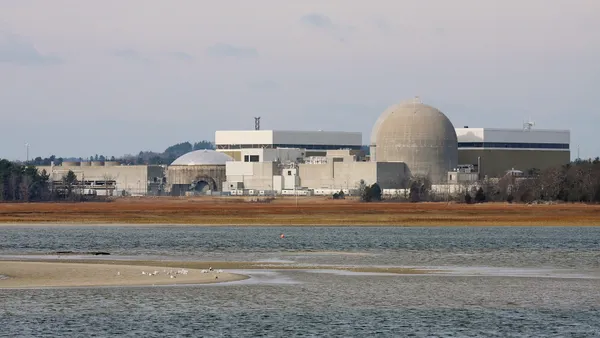Dive Brief:
- The residential ratepayer advocate for the District of Columbia announced Tuesday she opposes new conditions on the Exelon-Pepco merger settlement applied by regulators in the city last week.
- D.C. People's Counsel Sandra Mattavous-Frye said the regulatory order for new conditions "eviscerates the benefits and protections essential to render the proposed merger in the public interest." The Office of People's Counsel (OPC) previously supported the merger settlement brokered between Exelon, the D.C. Mayor's office and multiple merger intervenors in October.
- The OPC statement comes after D.C. regulators rejected the merger settlement Feb. 26 but outlined four new conditions that would result in its automatic approval if the settlement parties affirmed them. The OPC is the first settlement party to announce a position on the provisions, but Exelon and Pepco still have time to offer revised provisions to satisfy any party's concerns.
Dive Insight:
After nearly two years of deliberations up and down the mid-Atlantic states, D.C. regulators were left as the final hurdle for the $6.8 billion merger that could create the largest electric utility by customer base in the United States.
The Public Service Commission was widely expected to put an end to the merger saga last Friday, but instead gave it more life by extending the proposed deal and outlining four changes to the settlement that would result in its automatic approval.
In rejecting the proposal, regulators outlined areas of concern with the settlement, including that commercial and industrial ratepayers were shut out of a $25.6 million contribution to the customer investment fund (CIF) to offset rate hikes for residential customers.
Under the settlement, those funds were to be allocated to residential customers for relief from rate increases for about five years, but with the new conditions, that money would have to be allocated under Pepco's next rate case, which the PSC oversees. While those funds still could be applied to residential rate relief in that case, it could also be used elsewhere, and OPC was clearly unsatisfied with relying on regulatory oversight to allocate the funds.
"Unfortunately, the PSC’s alternative proposal for the application of the $25.6 million rate offset could translate into much higher rates for residential consumers because it removes a benefit essential to the justness and reasonableness of the merger for District residential customers, and therefore cannot be supported by the Office," the OPC statement reads.
OPC was a vocal opponent of the deal as it was originally proposed in April 2014, but then signed on to support a settlement deal the companies brokered with the mayor's office in October, citing the benefits of a residential rate freeze for D.C. residents. Under that deal, Exelon boosted its overall investment in the city from $14 million to $78 million.
All parties to the merger settlement have 14 days from the date of the decision to either support the new conditions on the merger settlement or file alternatives with the PSC. After that period, parties have seven days to reply.
The OPC is the first to come out with a position. Officials from Mayor Bowser's office could not be reached for comment, and Pepco had no immediate reaction. Exelon spokesperson Paul Adams said in an email that that Exelon continues to have conversations "with the D.C. government and other settling parties about the Commission’s order and the new provisions."
"The discussions are ongoing, and we will provide an update at the appropriate time," Adams wrote.
For more information on the merger, check out our feature on the PSC decision and this timeline on the merger saga.
Correction: An earlier version of this post stated that merger critics have labeled the $25.6 million CIF contribution from Exelon as "walking around money" for District government officials, since it was to be allocated to the D.C. government under the settlement deal.
That was incorrect. The "walking around money" refers to a separate $32.8 million allocation to the CIF which was to be given to various D.C. government agencies as a part of the settlement deal. Under the new regulatory conditions, the companies would create a new fund with two sub-accounts to hold $32.8 million of the $72.8 million CIF. One account would put $21.55 million toward pilot projects for the distribution grid; the other would contribute $11.25 million for energy efficiency and conservation initiatives focused on multi-family housing and low and limited income residents.












